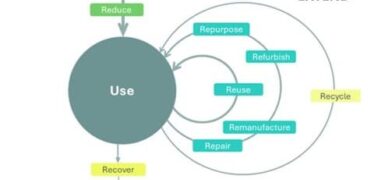In the face of the climate crisis and thus with an urgent need for all business sectors to turn to circular economy mode, public transport will definitely not stay behind. And what it also now has at hand is an outstanding benchmarking tool so as to precisely assess where it starts this greening journey from. Developed by trolley:motion with all project partners within a CE4CE project, Circularity Compass, or The Public Transport Circular Economy Self-Assessment Tool, is a useful, simplified and user-friendly survey for PT stakeholders, public and private transport authorities (PTAs) and operators (PTOs) in particular, allowing them to estimate the status quo, reflect on existing challenges and opportunities, and finally realise and identify possible and realistic actions to facilitate the transition to more circular public transport systems.
As for its mechanics, the Circularity Compass specifically aims to trigger profound rethinking and redesigning of PT systems along the Avoid-Extend-Transform framework so that resources and materials stop being unnecessarily wasted and environmental footprints along the whole PT value chain are reduced to net zero. In an ideal fully circular public transport value chain, products are procured and used in a practical way, and also they are durable, repairable and reusable by design, all in order to keep them circulating as long as possible and therefore reduce the extraction and use of new raw materials and resources to the utmost achievable extent. Once assets and material resources reach their maximum lifespan, transformation processes such as recycling are deployed so as to recover materials and put them back into the game, i.e. the value chain.
In the light of the above, The Circularity Compass survey questions one by one, depending on the company’s specific activities, refer to PT seven key areas, e.g. Vehicles, Batteries, Railway Infrastructure, Electric Infrastructure, Buildings, Energy as well as “softer” Knowledge, Governance and Policy, all with a common aim to identify one’s current position on the circularity map, raise awareness, provide abundance of directions and food for thought in terms of the supply, operation, and maintenance of assets in the organisation, and finally come to conclusions how to adjust one’s PT business to make it more sustainable and closer to net zero.
“In what quantity do you estimate the following materials to be present in a vehicle unit in your fleet?”, “What kind of measures has your company undertaken to extend the lifespan of your fleet in the last five years?”, “Once components or materials in your electric infrastructure reach their useful lifespan, what kind of end-of-life typical treatment do they receive?” - These are the kind of insightful and eye-opening questions providing an array of answers to select from that the survey respondents might expect which, like a compass, will show them the right direction to circular economy model.
The Compass has been tested and validated with numerous stakeholders in the form of several live and online life cycle actor workshops.
More Information: Public transport heading to circular business model - Interreg Central Europe (interreg-central.eu)
